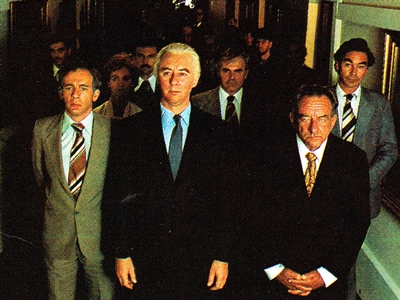
The screening of the mini-series The Dismissal — forty years ago this week — marked a significant landmark for both its host network, Ten, and in Australian television’s growing interest in mini-series production.
Australia’s commercial networks had hopped on the mini-series bandwagon as far back as 1976 with Luke’s Kingdom and 1978’s Against The Wind. Most of the mini-series that followed largely focussed on stories of distant history.
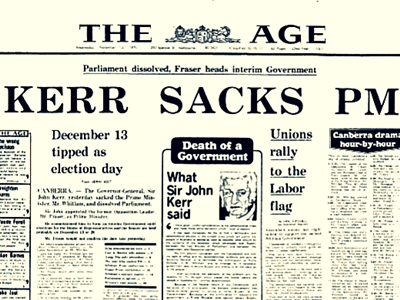
The 1975 constitutional crisis that culminated in the dismissal of prime minister Gough Whitlam was unprecedented in Australia’s political history and, with the mini-series produced only seven years after the event, was still well within the living memory of many. The Dismissal producer Terry Hayes said at the time: “I can’t think of any other TV program — anywhere — which has tried to recreate such controversial events while the primary participants are not only still alive, but many of whom hold positions of enormous power.”
The big budget drama, from producers Kennedy/Miller, also marked a new era for Network Ten. While the network had produced mini-series before, such as Water Under The Bridge and Sara Dane, The Dismissal marked the beginning of a determined move to counter the other networks with big-budget epics that would disrupt regular viewing habits by luring viewers in for two, three or four night, big event mini-series — emulating the screening of US mini-series Roots, which the network ran to huge success in the late 1970s.
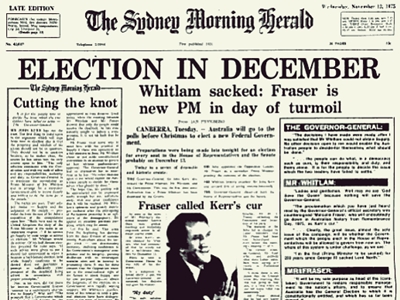
Ten originally planned to screen The Dismissal in November 1982 — coinciding with the seventh anniversary of the actual event. But with a real-life federal election on the horizon, the debut was ultimately postponed to 6 March 1983 — the day after the election.
But despite Ten’s interest in The Dismissal, not all of its member stations were enthusiastic. Adelaide’s Ten station — SAS10 — decided not to follow suit with its eastern state partners. The station’s owner Robert Holmes à Court, who also owned Perth’s TVW7, denied that his knocking back the series was politically-motivated. He claimed that the series budget of $2.6 million, of which his station would have to contribute, was just too high and that viewers would not be interested.
His refusal to pick up the series saw rival Adelaide commercial channels ADS7 and NWS9 enter into a bidding war. After the series aired in the eastern states to massive ratings (scoring a 42 in Sydney and 32 in Melbourne), Holmes à Court had a sudden change of heart and approached the producers with his renewed interest. He was to be informed that NWS9 had just secured the rights for Adelaide and would air the series in April.
Pre-production of the series was an intense exercise, with many prominent Liberal and Labor party figures, including some that were to be portrayed, briefing the actors on the events. It was noted, however, that the three central figures in the drama — Whitlam, Liberal leader Malcolm Fraser and Governor-General Sir John Kerr — declined offers to be involved in the consultation process. Journalists that covered the real thing were also to provide input into the production.
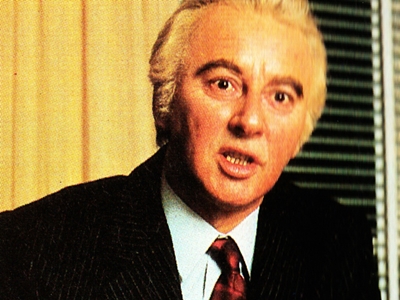
Filming took over four months. Actor Max Phipps, playing Whitlam, admitted that he was terrified of the role. “I was running around trying to get constant reassurance from people. I was absolutely terrified,” he told TV Week. “It was frightening because he’s still alive. He will be sitting there watching it.” While his re-enactment of Whitlam came with a lot of support from make up and wardrobe, he found imitating Whitlam’s voice a huge challenge and spent months working on it. “Everybody does it and everybody does it wrong,” he said. “So I just talked in his speech patterns and picked up a couple of his mannerisms — the way he nods his head when he talks, other things like that.” He recalled that being immersed in the Whitlam role for months was one of the most emotionally-charged, demanding and exciting times of his career: “I’ve been 19 years in this business and most of the time I’ve worked on garbage. But I think someone up there was saying to me that working for Kennedy/Miller on The Dismissal was a special present to make up for those 19 years.”
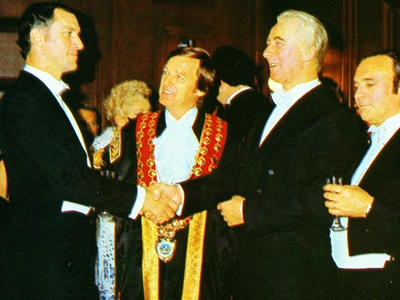
Also starring in The Dismissal were John Stanton as Fraser, John Meillon as Sir John Kerr, John Hargreaves as Dr Jim Cairns, Peter Sumner as Bill Hayden, Ruth Cracknell as Margaret Whitlam, Neela Dey as Junie Morosi, and Bill Hunter, Tom Oliver, Ed Devereaux, Sean Scully, Nancye Hayes, Martin Harris, Dennis Miller, Martin Vaughan, Tony Barry and Carol Burns.
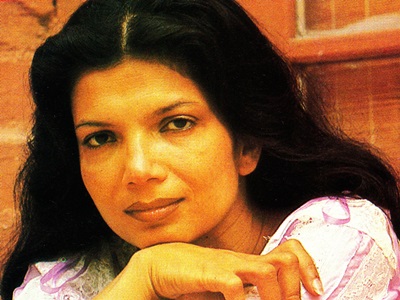
Despite the strong cast — headlining a total of 115 speaking parts — and meticulous research, not all reviews of the series were positive. The Canberra Times‘ Alan Fitzgerald, a political commentator at the time of the actual event, felt that the series was a “grossly simplified and ultimately partisan view of what happened.” Meanwhile, Canberra Times’ TV writer Ian Warden felt that the series lacked passion and that he became “tired of the timid neutrality of the whole account… I wish that the series had been made by people who had a rabidly partisan view of the events of 1975. As it is, almost the only scope that the series offers for anyone to take a side is John Stanton’s uncannily accurate portrayal of Malcolm Fraser.”
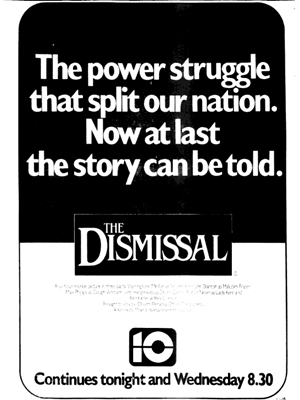
But on the flipside, The Dismissal not only attracted high ratings and positive critical reviews from other press — including The Age, which called it “one of the most important series ever shown on television”, and the Sydney Sun-Herald, which declared “even if you’re up to here with politics, don’t miss it” — but it was also well rewarded at the next year’s TV Week Logie Awards. The series collected industry peer-voted awards for Best Single Drama Or Mini-Series, Best Lead Actor In A Single Drama/Mini-Series (John Stanton) and Best Support Actor In A Single Drama/Mini-Series (John Meillon).
The success of The Dismissal led to a long relationship between Network Ten and Kennedy/Miller, with later blockbusters to include Bodyline, The Cowra Breakout, Vietnam, Bangkok Hilton and The Dirtwater Dynasty.
Source: The Canberra Times, 17 March 1983, 18 March 1983. The Age, 12 November 1975, 3 March 1983, 7 March 1983, 7 October 1989. The Sydney Morning Herald, 12 November 1975. The Sun-Herald, 6 March 1983. TV Week, 15 January 1983, 19 February 1983, 14 April 1984. TV Radio Extra, 16 April 1983. IMDB.
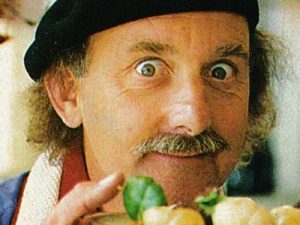
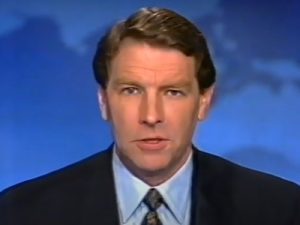
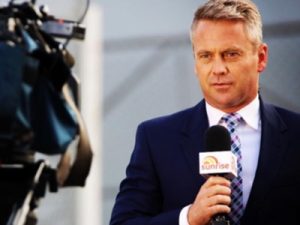
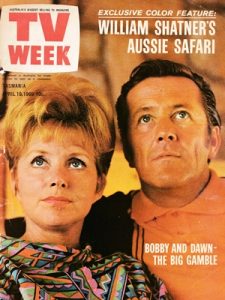
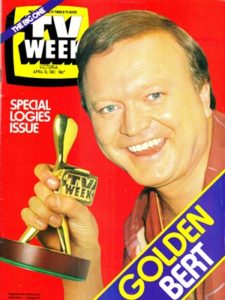
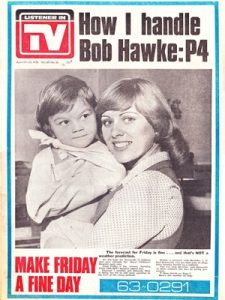
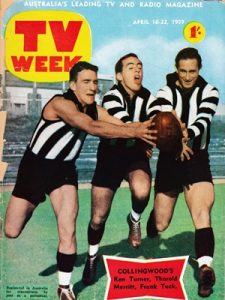
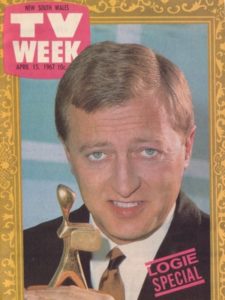
I was going to say the mini series was perhaps the last time I watched Channel 10, but I did watch the other mini series on 10 too. Thanks for the reminder of what seems now to be a golden era.
I loved it when it was first released and I have it on DVD and watched it again at Christmas time. I still love it. Such a gift to still be able to enjoy the work of so many talented actors, many of whom are no longer with us. I remember all the pollies they portrayed from childhood.